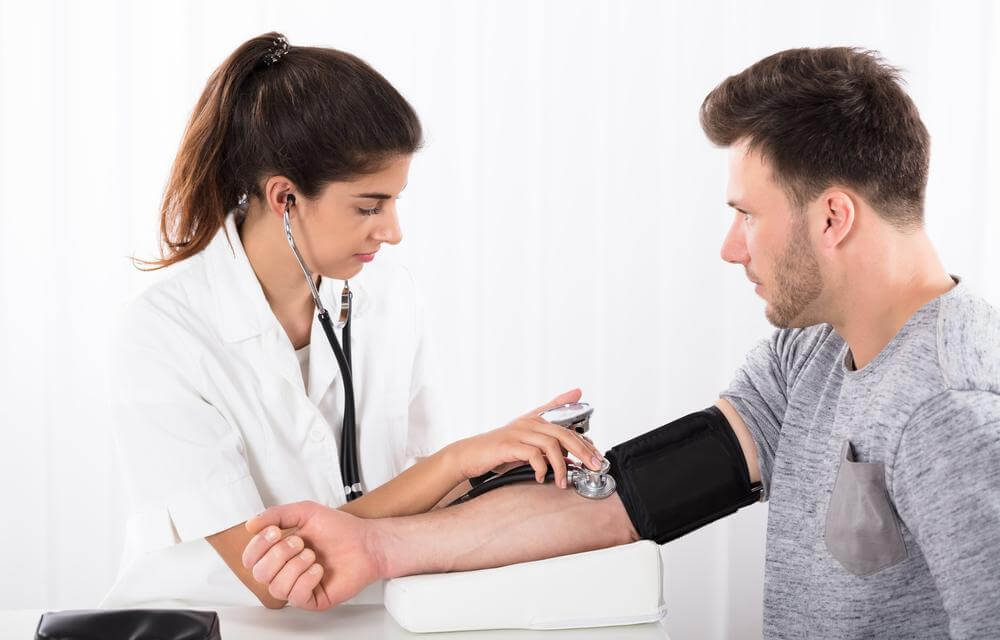Here’s How You Can Deal With High Blood Pressure

Here’s how you can deal with high blood pressure
A blood pressure chart can help you determine if you have a healthy blood pressure range. Based on your readings, you will have to sustain or make necessary lifestyle changes to gain complete control over your blood pressure. Your blood pressure is figured out using the systolic number (an upper figure indicating the amount of pressure the blood is exercising when the heart is beating) and diastolic number (a lower number which specifies the pressure your blood is applying in your arteries while the heart is resting between beats). It is measured in mmHg (millimeter of mercury).
Usually, a normal blood pressure level for any individual is less than 120 mmHg (systolic) and less than 80 mm Hg. Anything above that indicates prehypertension or high blood pressure (hypertension). However, hypertension has various phases, which is why you first must understand the high blood pressure chart. This will help you seek the best medical treatments as well as home remedies.
What are the different ranges mentioned on the high blood pressure chart?
Three ranges usually characterize the high blood pressure chart.
- Hypertension stage 1 – Here, the systolic range is between 140 to 160 mmHg, whereas the diastolic range around 90 to 100 mmHg.
- Hypertension Stage 2 – In this situation, a person’s systolic number between 160 or 180 mmHg. Moreover, the lower range is within 100 to 110 mmHg.
- Hypertensive crisis – This is a highly alarming stage where medical intervention is mandatory. Here, the patient’s blood pressure is at its peak, as it crosses 180 mmHg for systolic numbers and 110 mmHg for diastolic numbers.
What are the symptoms of high blood pressure?
High blood pressure doesn’t always cause any visible symptoms. Therefore, a routine checkup would be advised to all individuals to keep an eye on any possible fluctuations. However, if the hypertension is in its advanced stages, then it might lead to the following symptoms.
- Abnormal pounding in the chest or ears
- Exhaustion
- Problematic eyesight
- Irregular heartbeat
- Chest pain
- Disorientation
- Headaches
- Trouble while breathing
What are the causes of hypertension?
- No or negligible physical activities
- Excessive alcohol intake
- Lousy dietary habits
- Stress
- Genetics
- Increased weight or obesity
- Cigarette smoking
What are the risks associated with high blood pressure?
If hypertension is not managed with care, then it increases your risks for health issues such as:
- Vision damage
- Cardiovascular diseases such as heart failure or attacks
- Strokes which have a possibility of causing brain damage
- Kidney disorders
- Aneurysm
- Dementia
- Erectile dysfunction
Which foods can cause high blood pressure?
- Foods containing high sugar content such as cakes, donuts, cookies, sodas, pastries, etc.
- Excessive sodium (salt)
- Alcohol
- Coffee
- Full-fat dairy products
- Sauces
- Processed and canned foods
- Frozen meals
- Meats like chicken, red meat, bacon, etc.
What kinds of foods can help control or lower high blood pressure?
When you are dealing with hypertension, your diet should be little stringent. Apart from maintaining restraint on sugar, sodium, and fast food intake, you must include the following foods in your daily diet. These particular foods will not only prove to be beneficial for hypertension but will holistically improve your body’s immunity levels.
- Berries like blueberries, raspberries, strawberries, etc.
- Leafy green vegetables such as kale, beet greens, spinach, romaine lettuce, arugula, Swiss chards, etc.
- Yogurt
- Dark chocolate
- Bananas
- Oatmeal
- Avocado
- Fish with omega-3 such as salmon, mackerel, etc.
- Plain yogurt
- Baked or sweet potatoes
- Beet juice
- Skim milk
- Eggs
- Quinoa
- Broccoli
Apart from including the right foods in your diet regime, you should also assure to cook them in the right manner. For instance, you can switch to extra virgin olive oil which cooking and rather than frying ingredients, try using the baking method.
Apart from dietary changes, what measures to take to control high blood pressure?
- Regular exercise
- Shedding the extra pounds
- Combating stress via meditation, yoga, relaxation techniques, etc.
- Ditch smoking
Remember to keep an eye on the high blood pressure chart and regularly get yourself diagnosed by the doctor. If you wish, you can also check your blood pressure at home with the help of the high blood pressure chart.



